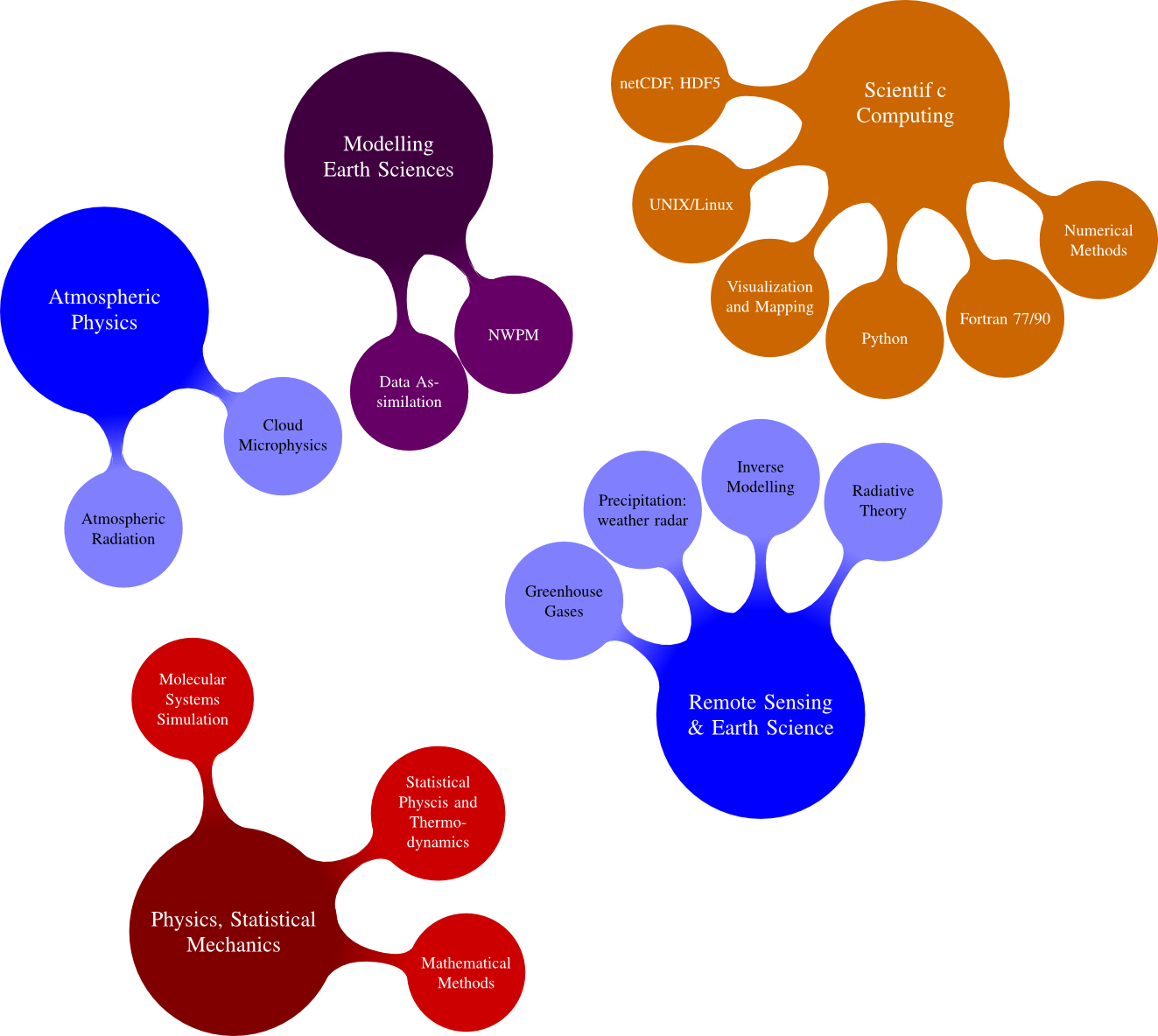Overview of my research interests and computing experience
Research Overview
One thing I have learned in a long life: that all our science, measured against reality, is primitive and childlike – and yet it is the most precious thing we have. ― Albert Einstein
General Overview
My main field of research is, currently, the climate response to several agents on the atmosphere, either greenhouse gases or aerosols. My academic career started with a B.A. in Spanish from the University of Granada, where I graduated on Physics with an specialization on Theoretical Physics. Awarded with a scholarship, I obtained a M.Sc. on Condensed Matter with an dissertation about theory of liquids (statistical physics of fluids) at the University Autónoma of Madrid, where I was also teacher assistant on Laboraties of Experimental Physics during two years. In the field of Atmospheric Sciences, I have a PhD on Remote Sensing and Micro-physics of Precipitation at Spain with an stage at NASA Goddard Space Center (sponsored by University of Maryland-Baltimore County). My experience as Postdoctoral research assistant includes the institutions:
- Laboratory for Sciences of Climate and Environment (LSCE) were I work for the CNRS on the climate modelling of Earth System with a focus on natural aerosols.
- The University of Reading, in collaboration with Keith Shine and M. Hegglin, where I studed the radiative forcing of several agents on the atmosphere, in particular Ozone.
- Karlsruhe Institute of Technology (Germany), where I worked on ESA-Sentinel-5 and G3E projects (remote sensing of greenhouse gase).
Participation in Projects
- CLIMDO: CLImate relevant processing of Mineral Dust by volatile Organic compounds
- CRESCENDO: Coordinated Research on Earth Systems aand Climate: Experimentes, kNowledge, Dissemination and Outreach
- AerChemMIP: Aerosols and Chemistry Model Intercomparison Project
- AeroCOM Phase III: Aerosol Comparisons between Observations and Models
- CCMI: Chemistry-Climate Model Initiative
- SMURPHS: Securing Multidisciplinary UndeRstanding and Prediction of Hiatus and Surge events
- ESA-Sentinel-5, ESA-Sentinel-5p and G3E: Assessments about sensors performance for these satellite platforms.
Scientific Interests
My objective is a better understanding of the climate response to greenhouse gases (in particular ozone) and aerosols (with an additinal focus on mineral dust), but also improve my knowledge of remote sensing applied on earth sciences. For the first question, I investigates the climate variability and radiative forcing estimations together with the role of the Ozone on the climate system (which is complemented by my interest on numerical models of atmospheric processes at several scales). My interest on remote sensing comprises develop simulations of the actual measurement conditions to assert the uncertainty and new applications of remote sensing, but also in-situ measurement to calibrate, test and validate satellite products and improve retrieval algorithms. I am interested on carbon cycle and water cycle application of remote sensing science.
Due to my professional trajectory my interest is also related with mathematical methods, in particular those related with statistics and statistical physics, together with scientific computing.
Membership of Professional bodies
Links to recent publications
Scientific Computing
Nothing in life is to be feared, it is only to be understood. Now is the time to understand more, so that we may fear less. ― Marie Curie
Overview
My daily research job is done with computers, that I use for data analysis of experimental data, and for modelling/simulation of physical processes. Therefore an important part of my background and skills rely on an area usually named: scientific computing. Traditionaly, for a Physicist, this implied to know how to program with Fortran but not much more (maybe complemented with basic understanding of Linux/Unix). Nowdays, the situation is different and scientific computing means a long list of tools and skills that a researcher should know, but even more she/he has to be able to choose the best possible tool for an specific problem between a large set of utilities and methodologies. As a consequence several academic programs include a kind of formation unofficially named software carpentry.
Tools in Atmospheric Sciences
My recommendations to work in modelling/simulation in Atmospheric Sciences rely on open-source software. Regarding the operating system I use nowadays only Linux, in particular Debian and NixOS (although I have used many distributions I have chosen these two). For programming, I think that still Fortran 90 (sadly also 77) is a necessary language to learn because of the large number of projects using it and its great performance for numerical calculations. But my recommendation is to learn other language for data analysis, visualization and other tasks. For this probably the clever option now is Python, although I dislike some aspects and I prefer for example Julia, the number of libraries and the general use of it in Atmospheric Sciences indicate that it is a mainstream language. You need also to be familiar with the file formats typically used in our field: netCDF, HDF5 and GRIB. Sometimes BURF and often plain and csv formatted text files. If you want to advance more in complex projects, then to learn make and bash is also a must. Learn a version control tool like git or svn is probably another must. For publications, I use LaTeX and inkscape for diagrams.
Key basic libraries
- Fortran 90: LAPACK / BLAS
- Python: numpy, scipy, xarray, pandas, iris (of scitools from MetOffice), ESMValTool, Matplotlib, Cartopy
- Docummeting: Doxygen (for Fortran), Sphinx (for python), Documenter (for Julia code)
- Version control: Subversion (svn), gihttps://languagetool.org/t, Mercurial (Hg)
- Publications: LaTeX/Tex and Inkscape
My scientific codes
You can check them at Software Codes